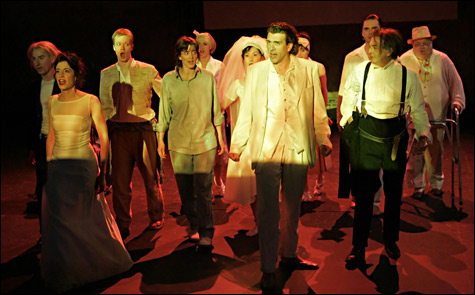
FIGARO: Combine Mozart and Beaumarchais and you get a Molotov cocktail.
|
Figaro and Count Almaviva are holed up in a sacked mansion opposite the Bastille. It’s 1792, “year one” of the French Revolution, and what sound like fireworks are exploding outside.
FIGARO
(in repertory at the Loeb Drama Center through October 6) is a Molotov cocktail made up of Beaumarchais’s third Figaro play, the 1792 La mère coupable (“The Guilty Mother”), and the 1786 Mozart opera Le nozze di Figaro, here a “flashback” to happier, pre-revolutionary times. Of course, the Minneapolis-based Théâtre de la Jeune Lune, which has brought its “opera plays” Don Juan Giovanni and Figaro to town courtesy of the American Repertory Theatre, did not invent the connection between Mozart’s opera buffa and off-with-their-heads. Napoleon called Le nozze di Figaro “the revolution already in action.”
Figaro has a sharper structure than Jeune Lune’s contemporary road trip for buddy lotharios, Don Juan Giovanni. It borrows the premise but not the plot of La mère coupable, landing the clever servant and his long-time employer in Pairs in the midst of the Terror. As usual, Figaro is saving his unrepentant master’s “godforsaken noble ass,” smuggling the one-time Count, now “Mr. Almaviva,” into their refuge in a wardrobe. Sixteen years after Figaro’s nuptials, this Beckettian pair are more affixed to each other than either is to the woman in his life, however passionately the Countess and Susanna were wooed in Il barbiere di Siviglia and Le nozze di Figaro (though Figaro longs for Susanna, whom he’s sent for her safety to America). We meet the distaff characters only in operatic flashback to the halcyon days of legitimate love and forcible seduction, days full of bed trickery and hiding in closets. As a program note observes, “A Figaro without Susanna is heartbreaking, but a Figaro without the Count is impossible.”
The non-operatic half of Figaro is superbly acted by co-conceivers Stephen Epp and Dominique Serrand as a Lucky and Pozzo turned Vladimir and Estragon whose hierarchical pinions but not their old habits have collapsed. Their piqued, existential interaction, with Epp’s gray-pigtailed Figaro sometimes peeling potatoes as Serrand’s wild-haired aristocrat peeks through a small window in his locked closet, is very funny, though tinged with melancholy as memories spill from everywhere — out of an on-stage bed and the Count’s cupboard or from behind a screen that provides cinematic close-ups — set to Mozart’s sublime music.
As in Don Juan Giovanni, the operatic component falls to eight terrific actors/singers accompanied by an accomplished piano quintet anchored by musical director Barbara Brooks. What the singers present, on an almost bare set backed by some ornate residential projections, is a sort of mini Nozze di Figaro, minus a few characters but complete with a couple of musically complex act finales. These are not, however, the most indelible moments. Those include Jennifer Baldwin Peden’s fierce yet anguished Countess being pulled across the stage reclining in a red-satin-lined boat while singing her exquisite aria of disconsolation, “Porgi amor,” and the final letter from Christina Baldwin’s lanky Charlie Chaplin of a Cherubino, to which the Countess issues a grieving reply as the mischievous adolescent’s corpse rolls away. Lush soprano Momoko Tanno is a charming Susanna and baritone Bradley Geenwald a callous, impetuous, sometimes even antic young Count. But what makes Figaro so poignant is that, though its opera component ends more happily than Figaro and Almaviva do, its musically glorious unfolding, in which the elderly duo eventually join their younger ghosts, reveals that the touted past, like the new world unfolding, glistened as much with suffering as with green-tinged sunlight.
Robert Brustein says he “dreamt” much of
THE ENGLISH CHANNEL
, dashing from couch to computer to write it down. Would that someone had waked the eminent critic and founding artistic director of the American Repertory Theatre, because The English Channel is a Saturday Night Live sketch set in 1593 and written by a waggish, learned person. In its world premiere at Suffolk University’s C. Walsh Theatre (through September 15), the play is set in a prop-stuffed room above London’s Mermaid Tavern, with the 29-year-old Will Shakespeare cranking out sonnets for money, now that the city’s theaters have been shuttered by the plague. Visiting him in his lair: his (then more celebrated) rival, playwright Christopher Marlowe; his young poppycock of a patron, Henry Wriothesley, Earl of Southampton; and poet and court musician Emilia Lanier, whom Brustein not unreasonably conjectures is the sonnets’ dark lady. But what takes place among these historical figures is mostly one long literary joke, with everyone saying things that either are lifted from or prefigure Shakespeare’s plays as the cribbing young Bard hustles to commit their remarks to paper. Hence the title of the play, which casts the playwright not as the moony young romantic of Shakespeare in Love or the gifted versifier touching up the Earl of Oxford of The Beard of Avon but as a blank slate looking to channel what he can, including inspiration.